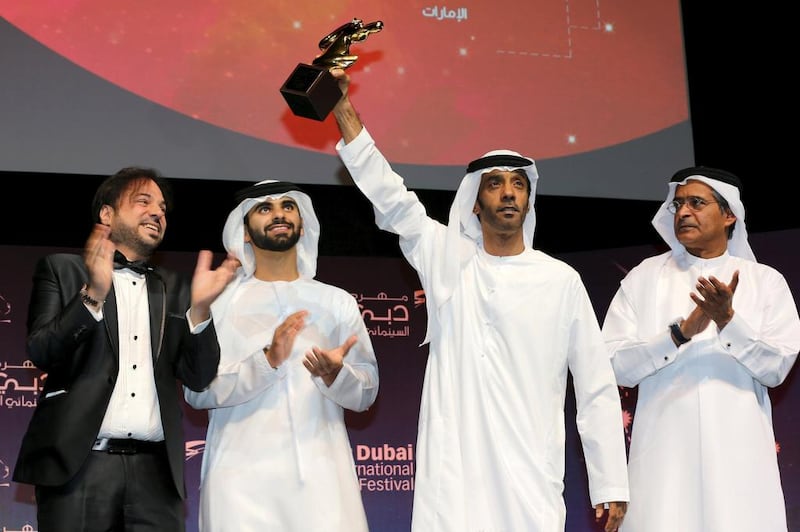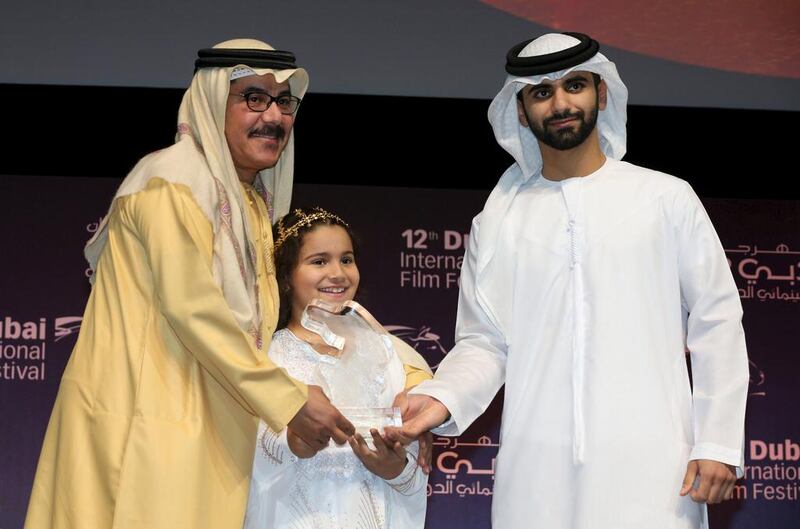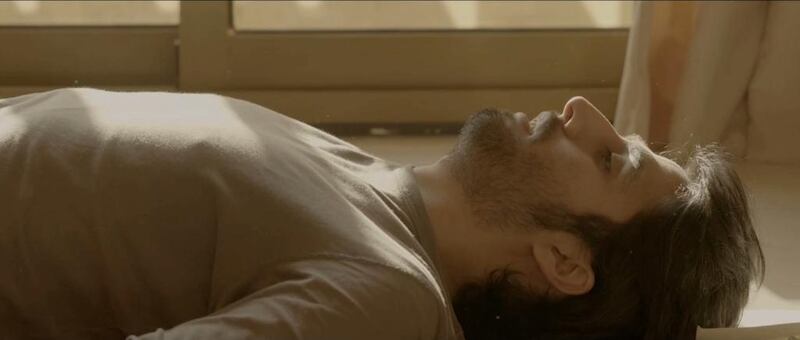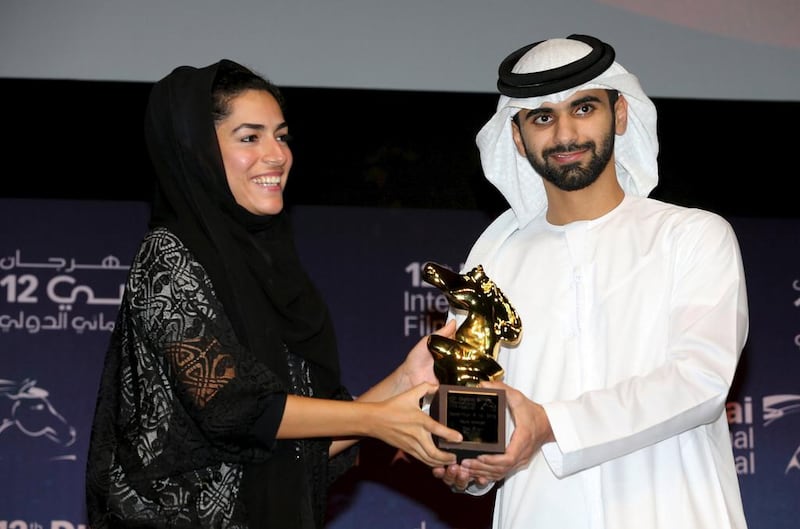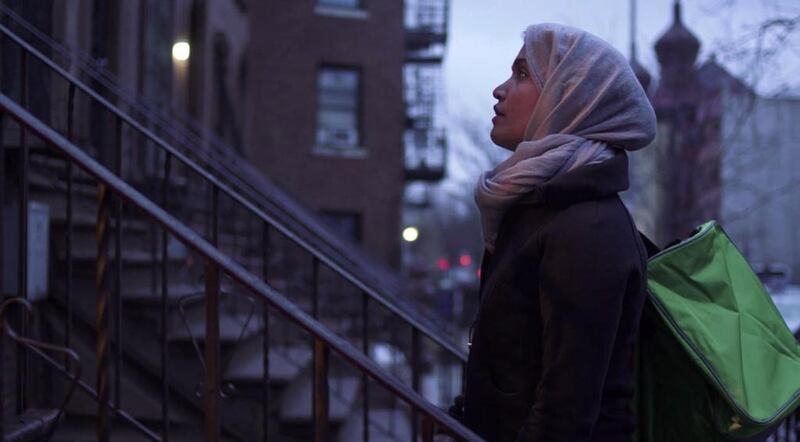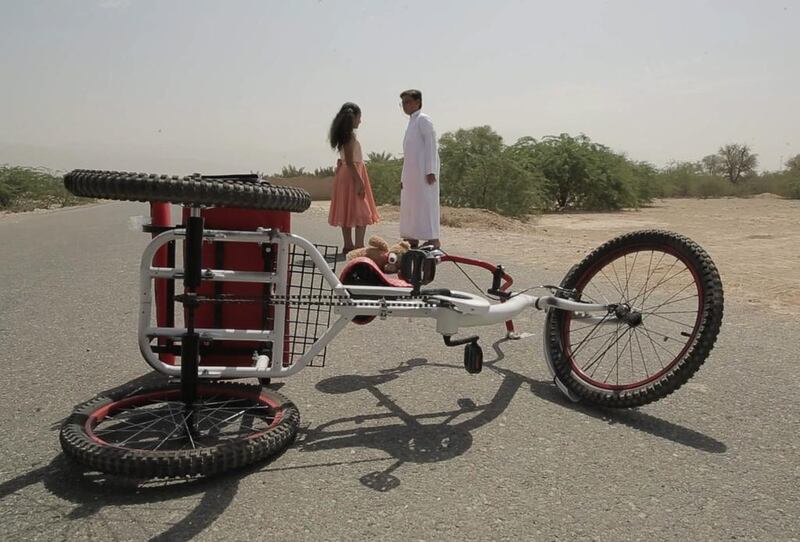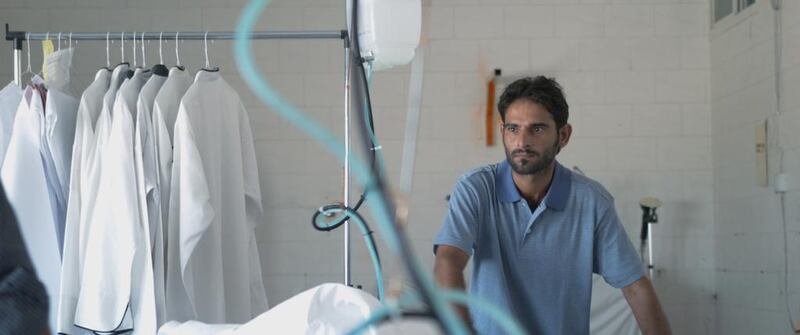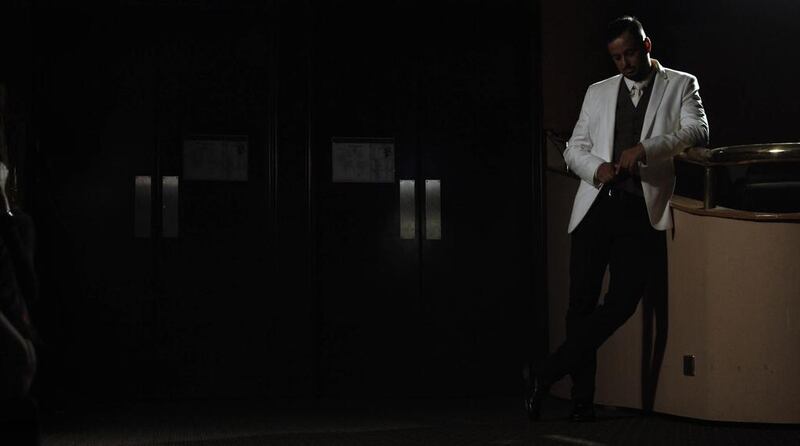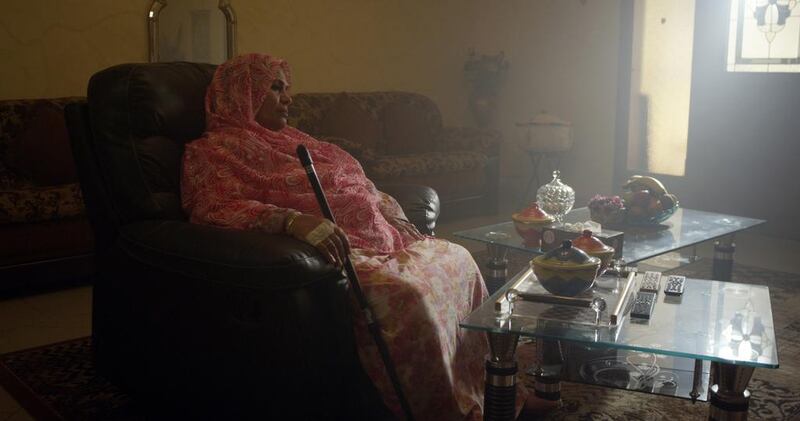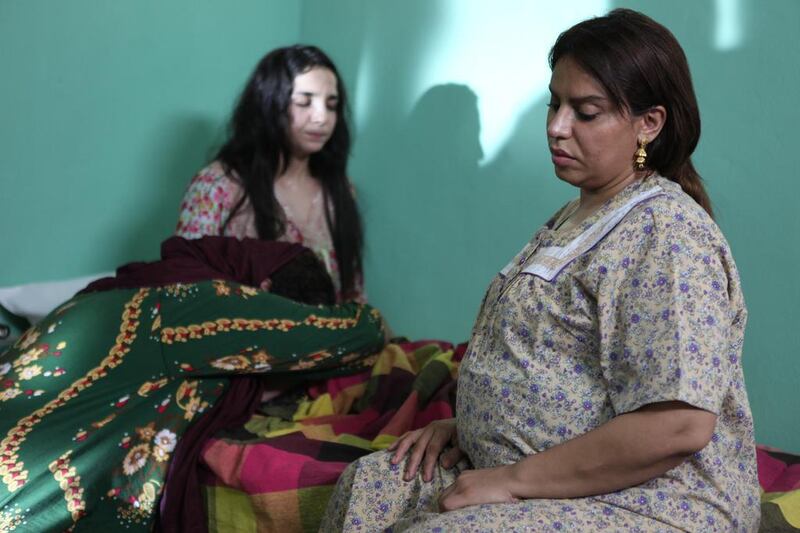The Emirati filmmakers nominated for Muhr awards at this year’s Dubai International Film Festival. An unprecedented six feature films made in the UAE screened at the 12th edition of the Dubai International Film Festival this month. In addition, seven short films by Emirati directors competed for the Muhr Emirati award. Diff’s artistic director, Masoud Amralla Al Ali described this achievement as “tangible proof of the growth of the Emirati film industry in recent years”. Jessica Hill talked to this year’s prize-winning Emirati directors, and to the other local filmmakers and stars whose films made an impact at the festival.
Feature films
Best Emirati Feature Going to Heaven Saeed Salmeen Al Murry
Seven years after winning the Best Emirati Filmmaker award at Diff, Saeed Salmeen Al Murry's latest feature film, his second, won the Muhr award for Best Emirati Feature. Going to Heaven tells the story of an 11-year-old boy who sets off with a friend on a road trip from Abu Dhabi to Fujairah to escape the cruelty of his stepmother and search for his long-lost grandmother. Al Murry lost his mother when he was about the same age as the film's young protagonist, Sultan, so the film's central theme of a boy longing for a caring maternal figure in his life is one he drew on personal experience to create. "I felt pain about my own mother's absence for a long time, so I wanted to make a story similar to my own story", he says. The project took almost three years to complete, not because of a lack of funding – it scooped the US$100,000 (Dh376,314) Minister of the Interior award at Diff last year, and was co-produced by Image Nation – but because of the arduous task of finding the right children to play the lead roles. "Saeed spent one year looking for the kids", says Going To Heaven's Bahraini assistant director, Ammar Kooheji. "He saw a lot of kids in that time but in the GCC there aren't many kids who can act in this kind of movie. They don't have the experience, and they lead such peaceful lives with their iPads and home comforts – they don't live with struggle."
The boys who Al Murry eventually found, Jumaa Al Zaabi and Ahmed Al Zaabi, had both lost their fathers, “so they could understand the pain of the loss of a parent figure”, says Al Murry. He spent every day with the boys for three months in Abu Dhabi preparing for the shoot.
“We’d go together to the cinema, eat together, play games together, and through that time I started feeding them the script little by little,” says Al Murry. “They started treating me like a father. So when we actually started shooting, the kids knew the script completely.”
The crew, from France, had 24 days to shoot the movie on location in Abu Dhabi, Sharjah, Dubai and Fujairah, which presented a challenges as the boys’ school holidays didn’t last that long. “The crew were 45 people and only these two kids – it was so difficult,” Al Murry says. “We had to build up a rapport and play with them so the boys didn’t get bored.”
• Going to Heaven is due to go on general release in the UAE in August
Best Director A Tale of Water, Palm Trees and Family Nasser Aldhaheri
The Muhr Emirati Best Director award went to Nasser Aldhaheri for his 162-minute documentary, which he wrote, directed and produced as a poignant tribute to those who depended on water, palm trees and family to survive in the UAE’s past.
“I wanted to put the flavour and the kindness of the Emirati people into this movie”, he says. “This was a two-year project and I put everything I had into it.” During his career as an established poet, novelist and journalist, the 55-year-old has written extensively on the theme of Emirati culture in numerous novels, short stories and newspaper articles. But this was his first foray into cinema for many years.
“I had made a movie as a graduation project and then I became a journalist and suppressed that dream,” says Aldhaheri, who is from the country’s cultural heartland of Al Ain. “Cinema always seemed to call me, though – I dreamed of walking the red carpet one day.”
“We want nice stories that reflect where we come from,” says Farazdak Chachan, the film’s executive producer. “But other film platforms do not completely understand our Emirati ideas and our civilisation. When our movie was screened [at Diff], 95 per cent of the viewers were foreigners. We need more local support.”
Abdullah
Humaid Al Suwaidi
Abdullah is the story of an Emirati boy in a conservative family who develops a passion for music. As the years pass, his deep musical passion becomes harder to conceal from his traditional, religious family.
It was the first feature-film role for Emirati actor Mohammed Ahmed, 25, who plays Abdullah.
“My character is an Emirati composer who tries to make it despite the difficulty in society”, says Ahmed, who is now doing his national service. “Emirati films usually carry the same concepts in them every time, but this film is different. The result is really amazing.”
Abdullah’s producer, the Egyptian Ahmed Lofty, quit his job in management and business development a year ago to work full time on the film.
“I put everything aside, career-wise, to come on board from pre-production onwards,” he says. “I am enjoying this immensely more than the corporate world – I think I have found my calling.”
• Plans are being made to screen Abdullah in cinemas next year
The shorts
Best Emirati Short Omnia Amna Al Nowais
When Amna Al Nowais, winner of the Muhr Award for Best Emirati Short, heard about the illegal “purification ceremony” – female circumcision – that Abu Dhabi-based Egyptian Omnia Ibrahim went through as a young girl and the effect it continues to have on her life, she resisted the idea of making a film about it.
“At first, I didn’t want to perpetuate this narrative of Arab women as victims,” says Al Nowais, 27. “But when I met Omnia, I really liked her character. She’s very spontaneous and I knew that she wouldn’t change who she was on camera.
“The way that she expresses her story was encouraging, too – I felt the story itself would contain other layers that were very interesting.”
Al Nowais found 32-year-old Ibrahim after interviewing four psychologists. She has had three years of counselling in an effort to come to terms with the illegal circumcision performed, with her parents’ consent, when she was 10 or 11. Al Nowais explores the physical and psychological effects this has had. “It wasn’t difficult making her feel comfortable in front of the camera because at that point she had wanted to speak about it,” Al Nowais says. “Omnia wanted to create awareness – she thought: ‘If I don’t speak about it then who will?’ I think she also felt that speaking out was one way of enabling it all to make sense to herself.” To earn and maintain Ibrahim’s trust and confidence, Al Nowais used an all-female crew. “There were only three females in the room, really, to create a safe place, which maintained Omnia’s comfort”, she says.
Al Nowais, who lives in Abu Dhabi, studied Hebrew and politics at Soas, University of London. She is now widening her filmmaking experience by working on bigger projects. “I can’t really disclose much about them but they are feature films made in the UAE”, she says. She plans on using her Dh50,000 Muhr Award prize money to make a fiction film next. “First a short film. I’ll see how that goes and then take it from there,” she says.
Open Wound Sarra Alshehhi
Sarra Alshehhi, 25, was not afraid to tackle a hard-hitting subject head-on in her first short film, Open Wound. The drama explores the feelings of Nadia, a young professional boxer who meets the man who molested and abused her – her uncle. The director is a second-year student at New York University's prestigious Tisch School of Arts, and her crew and actors were all New Yorkers. She says tackling such a harrowing topic put her completely outside of her comfort zone. "New York is a very aggressive environment and it has been personally intensive for me to direct it and work with the actors because of the topic and how sensitive it is," says Alshehhi, who is from Ras Al Khaimah.
“I had to direct the actress by transferring this horrible feeling of having gone through this abuse to her and to transform this guy into feeling like he did this horrible thing.
“On set, everyone felt the vibes were so dark. When you write and shoot a film, it’s like you’re living this film every day in every process – you have to do this to make it as real as possible. After this project, I need one with a happier vibe.”
Alshehhi had a message for other Emirati women who want to go into filmmaking.
“So many women in the UAE want to make films but they have a lot of challenges on the way and they get lost,” she says. “I don’t blame them. But if you’re out there as a woman and you want to make films, please fight for it. I totally understand if you have family who do not understand the dream – but make that effort of talking to them about it. “It is so important for us to hear the women’s side of the Emirati story, we need it so much, and it is so easy for us not to be represented.”
My Dear Home With Love Aisha Al Zaabi's My Dear Home With Love is the second film made by 22-year-old Aisha Al Zaabi, a media-production student at Abu Dhabi Women's College. Her first, The Other Dimension, won last year's Muhr award for Best Emirati Short.
The latest focuses on 9-year-old Fatima, whose family is forced to move house because her father doesn’t have enough money to pay the rent.
“She misses her old house, friends and school”, says Al Zaabi. “She meets this boy, 11-year-old Khalid, and he helps her to go to the old home.” Whereas her last movie was a horror, Al Zaabi describes this one as a comedy.
Also in the frame
The Man Who Saw Snow in Summer Ali bin Matar
In this short film, his second to screen at Diff, Ali bin Matar tells the true story of a Pakistani laundryman in Abu Dhabi. "He is overworked, his boss doesn't give him a good salary and he needs to pay school fees for his children back home," says the 27-year-old director. Matar is a cinematographer by profession, who worked on the feature film Grandmothers Farm Part 2. He is now writing a script for his own feature film.
The Man Who Met an Angel Tariq Al Kazim
Tariq Al Kazim, 23, graduated from New York Film Academy eight months ago, but returned to his professors to seek their advice on whether the script he was writing might cause offence
“The story is very sensitive here,” he says. “It is about a man who wants to help people by saying he has seen an angel. One man doesn’t believe him and the whole film is about him proving to him that he saw an angel.” It took Kazim a year to write the script for the short drama.
“It made me go crazy. Every time, I would rewrite it and somebody, somehow, would find it offensive. Eventually, I delicately wrote it in a way that no one who watches this movie will recognise a religion – they will just see that it is connected with them.”
He also struggled to find actors. “Eventually I found the two actors and by a stroke of luck they had great chemistry between them,” he says.
Kazim says the most important thing he learnt making the film was that “you’re mistaken as a filmmaker if you think you can do it all alone. My actors also helped me with advancing the script and managed to bring out the most touching dialogue”.
Beshkara Abdulrahman Almadani
Beshkara, an Emirati slang term for “maid”, tells the story of Mariam, a housekeeper who works for an Emirati grandmother. When Mariam’s daughter in the Philippines falls ill, the old woman doesn’t want to let her leave.
“On the surface, it’s about the old woman’s controlling nature – she doesn’t want to give the beshkara the luxury of having her own passport,” says the film’s producer, Azalia Ganji. “But what drew me to the film was that the grandmother is also a victim, as she is very alone. Her children don’t take care of her, so the reason why she doesn’t want to let Mariam go is that she’s very fond of her as a daughter.”
Almadani, 23, is a freelance filmmaker in Dubai. Last year he screened a film at the Abu Dhabi Film Festival called Nagafa, which means “bogey”, about kids being bullied. “My films tackle adversity because I think the best way to tackle these subjects is to make a film about them to raise awareness,” he says.
Smell of Bread Manal Ali bin Amro
The deaf daughter of a baker is subjected to abuse in her own home in this film by Manal Ali bin Amro, who was named Most Promising Filmmaker at Diff in 2009. The quiet life of the girl is thrown into disarray after she is attacked and her family members refuse to acknowledge it. Bin Amro, 37, lives in Abu Dhabi and also writes.
